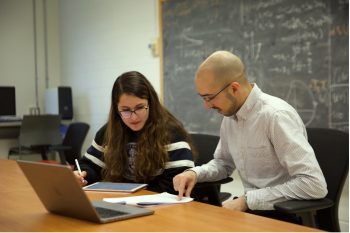When you win a competition by time measured in milliseconds, it’s like being in the Olympics. That’s what happened to Shang Wang (ECE 1T7) at the first Connect6 game competition, organized as part of Engineering’s APS105 computer programming course.
Connect6 is a cross between the popular Chinese board game Go, and tic-tac-toe. The board measures 19 squares by 19 squares, and the object is to get six game pieces in a row – either up and down or on a diagonal.
But the game Wang played – held in the atrium of the Bahen Centre for Information Technology on Nov. 29 – came with a twist. The ‘players’ were actually computer programs that first-year Engineering students wrote as part of an assignment. Students’ programs were pitted against each other, and the games were projected onto a screen. If a game was a draw, the program that took the least amount of time to play, won.
The Connect6 competition attracted close to 150 students. The event added a whole new dimension to making an assignment exciting, according to Professor Jason Anderson (ECE) who came up with the idea.
“It was the first time we’ve given first-year students an open-ended programming problem, and the first time we’ve created a project-related event like this. The solutions students produced were remarkable and shows you can encourage excellence in ways that are fun,” he said.
Prior to the event, all students’ programs were played against each other (more than 400 first-year U of T Engineering students take this introductory programming course), until there were eight finalists. The winning game was a draw, but Wang’s program beat that of his classmate, Rongzhen Cui (ECE 1T7) by 11 milliseconds. Cui came in second, overall.

“I was surprised I was selected for the finals,” Wang said. He had never played board games before, and relied on help from a classmate to work out game strategies to improve the odds of winning.
Jake Kutkevicius (TrackOne) came in third. All three students described the project as fun, and enjoyed the challenges of the assignment. They were each awarded a Google Nexus 7 Tablet.
According to Professor Jonathan Rose (ECE), it was the first time instructors tried using a game as a way of exposing first-year students to the type of problem-solving conundrums they’ll encounter later in life. “We were impressed with the quality of the programs the students wrote,” he said.



